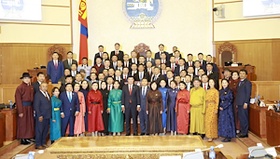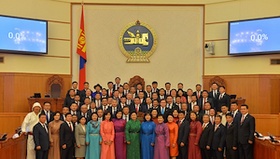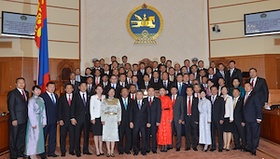The electors' trust has bestowed a unique composition upon the parties and political forces obtained seats at the fourth election parliament to commit themselves for joining together and cooperating closely in building the formation and performance of the government. Thus, this parliament had carried out its policy and endured its legacy in the most critical period of the country's political life.
Seven different political parties and a coalition of three parties participated in this State Great Hural election and the MPRP-37, the coalition "Mother Country-Democracy”-35, Republican Party-1, and 3 independent candidates have won seats at the 2004 Parliamentary election. Uniquely, without a majority or minority and with balanced presence of major political forces, this parliament has given a historical opportunity to the main political forces to deliver results and reach consensus through a close collaboration.
Therefore, the MPRP and the coalition "Mother Country-Democracy" have formed coalition government according to the signed Consensus agreement that was reached on mutual scrutiny with joint commitment for the benefit of the common interests of Mongolian people and the national development and prosperity.Although the coalition "Mother Country-Democracy” has been abolished in December 2004, the 26 State Great Hural members of the Democratic, Civil Will and Republican parties have voluntarily joined into the MPRP caucus at the State Great Hural in order to provide continuity of the government affairs.
In July 2005, however, the announcement of the MPRP caucus of the State Great Hural decision to function by itself exclusively, has dissolved the Government of National Unity so that a new coalition government has formed. The main principle of the parliament to adhere, under this circumstance, was the well-founded mutual consensuses of political parties and their well-maintained commitment to serve the people's interest and national unity while standing on their views and positions.
While dutifully served its responsibilities with high esteem, this parliament has indeed created a history of an intricate yet edifying period of Mongolian parliamentary system and its development.
The following are some notable Laws and Resolutions of this parliament:
- An adoption of the "Concept on the national legislation improvement until 2008" has further strengthened the legal reform policy.
- The Millennium Development Goal (MDG) based "Comprehensive policy of National Development" has been adopted.
- The adoption of the Law on Oil products, was the first of this kind of independent legislation in Mongolia regulating oil industry, importing and supply issues.
- The adoption of the Law on Renewable energy has facilitated opportunities to resolve challenges on building electricity network, ensuring independency and reliability of regional electrical supplies and providing electricity for herders, remote sums and settlements.
- The State Great Hural has adopted the Anti-corruption law. By adopting the Public Radio and TV law, moreover, the State Great Hural has restructured the national broadcasting and radio independent from the government as a gesture of promoting freedom of press and media and free business competition.
- The State Great Hural has endorsed other major legislative documents that include the Mineral law (modified), Law on Administrative and territorial units of Mongolia and their governance (modified), Law on Railway transportation, Law on determining rates on value added tax, the General taxation law (modified).
- As sufficient measures toward social welfare, protection, pensions and pension increase, the State Great Hural has adopted the following laws that include the Law on cash subsidy to children and cash subsidy to children and families, Senior citizens' Social protection (modified), State increments to State Hero of Mongolia, Labor hero of Mongolia and Stately Merited or honored senior citizens.
- Within the framework of the legislative reforms of parliament and implementation of a new system for election, the State Great Hural has adopted the Law on State Great Hural (modified), Law on State Great Hural Rules of Procedures and the Law on State Great Hural election (modified).
As the structure of the State Great Hural concerns, this parliament has modified its Standing Committees, the form of its organization, for three times. The parliament commenced in August 2004 with seven Standing Committees and increased the number to eleven in December 2004. Lastly, in 2006, the parliament has reduced the numbers to the following seven standing committees.
1. Standing Committee on Security and Foreign Policy /Chaired by M.Enkhsaikhan, R.Gonchigdorj and B.Munkhtuya in respective elections/
2. Standing Committee on Nature, Environment, Food and Agriculture /Chaired by Ch.Radnaa, A.Bakeye, Ya.Sanjmyatav respectively/
3. Standing Committee on Social Policy, Education, Culture and Science /Chaired by S.Lambaa and T.Gandi respectively/
4. Standing Committee on State Structure /Chaired by Su.Batbold and D.Dondog respectively/
5. Standing Committee on Budget /Chaired by R.Badamdamdin, Ch.Ulaan and L.Purevdorj respectively/
6. Standing Committee on Legal Affairs /Chaired by D.Odbayar, Ts.Munkh-Orgil and Ts.Sharavdorj respectively/
7. Standing Committee on Economic Policy /Chaired by Ts.Damiran, L.Gantumur and D.Gankhuyag respectively/

 Eng
Eng  Монгол
Монгол

